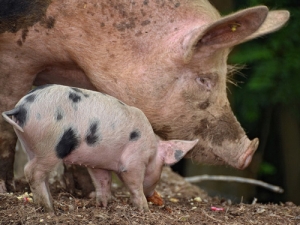NZPork Urges Government to Protect Productive Rural Land in Planning Reform
NZPork says the Government needs to strengthen its proposed planning laws to ensure New Zealand's pig farmers can continue to produce pork.
 New welfare standards came into effect in pig farming yesterday, meaning sows and gilts must not be confined in stalls during pregnancy.
New welfare standards came into effect in pig farming yesterday, meaning sows and gilts must not be confined in stalls during pregnancy.
New welfare standards came into effect in pig farming yesterday, meaning sows and gilts must not be confined in stalls during pregnancy.
A gilt is a young female, generally under 12 months. The use of mating stalls for service is permitted, for no longer than one week. New Zealand is one of very few countries in the world operating to this standard.
NZPork has put in place a traceability system so that consumers can be sure the pork they are purchasing meets these requirements.
Compliance with the Code of Welfare is a requirement for PigCare accreditation, and only pork from PigCare accredited farms is eligible for labelling as 100% New Zealand pork (or ham or bacon). This is confirmed by traceability of pork from PigCare accredited farm to wholesaler, and through the supply chain to finished labelled product.
By purchasing 100% New Zealand pork (or ham or bacon) PigCare accredited, consumers can be sure they are purchasing pork from animals born in New Zealand and raised according to New Zealand's animal welfare requirements.
Imported pork, ham and bacon does not have to meet these requirements nor is it PigCare accredited.
For more information on PigCare and animal welfare check out http://www.nzpork.co.nz/pigcare-and-animal-welfare
OPINION: "We are back to where we were a year ago," according to a leading banking analyst in the UK, referring to US president Donald Trump's latest imposition of a global 10% tariff on all exports into the US.
DairyNZ says the Government’s proposed Resource Management Act reform needs further work to ensure it delivers on its intent.
Overseas Trade Minister Todd McClay says he's working constructively with the Labour Party in the hope they will endorse the free trade agreement (FTA) with India when the agreement comes before Parliament for ratification.
Donald Trump's latest tariff tantrum has again thrown the world of trade into a new round of turmoil and uncertainty, and NZ is caught up in it.
The third edition of the NZ Dairy Expo, held in mid-February in Matamata, has shown that the KISS principle (keep it simple stupid) was getting a positive response from exhibitors and visitors alike.
Twenty years ago, South African dairy farm manager Louis Vandenberg was sent to a farm in Waikato to provide training on Afimilk technology.